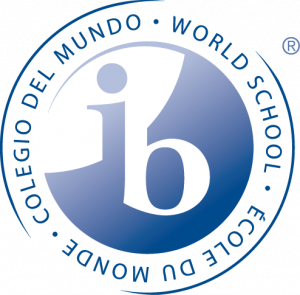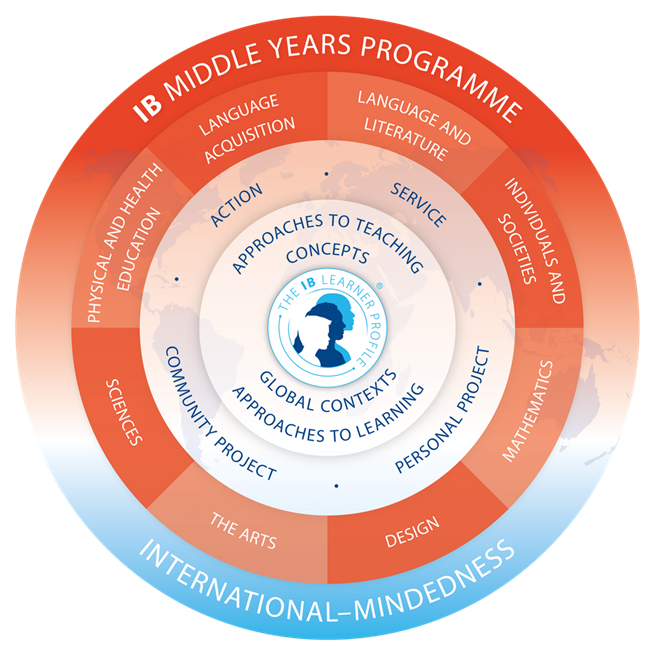PYP Curriculum Model
10 Reasons
Curriculum Model
Mission Statement from the IB
The International Baccalaureate aims to develop inquiring, knowledgeable and caring young people who help to create a better and more peaceful world through intercultural understanding and respect. To this end the organization works with schools, governments and international organizations to develop challenging programmes of international education and rigorous assessment. These programmes encourage students across the world to become active, compassionate and lifelong learners who understand that other people, with their differences, can also be right.
IB Education
Focuses on learners – the IB’s student-centered programmes promote healthy relationships, ethical responsibility and personal challenge
Develops effective approaches to teaching and learning – IB programmes help students to develop the attitudes and skils they need for both academic and personal success
Works within global contexts – IB programmes increase understanding of languages and cultures, and explore globally significiant ideas and issues
Explores significant content – IB programmes offer a curriculam that is broad and balanced, conceptual and connected.
IB learners strive to become inquirers, knowledgeable, thinkers, communicators, principled, open-minded, caring, risk-takers, balanced, and reflective. These attributes represent a broad range of human capacities and responsibilities that go beyond intellectual development and academic success.
The Primary Years Programme: preparing students to be active participants in a lifelong journey of learning
The Primary Years Programme (PYP) is a curriculum framework for young learners aged 3-12 designed by the international Baccalaureate (IB). Founded on a philosophy that recognizes a child’s natural curiosity,creativity and ability to reflect, the PYP generates a stimulating, challenging learning environment to nurture those assets and foster a lifelong love of learning in every child. The PYP, like all IB programmes, is transdisciplinary, meaning students learn across subject areas while investigating big ideas
The IB Primary Years Programme
Addresses students’ academic, social and emotional well-being
Encourages students to develop independence and to take responsibility for their own learning
Supports student’s efforts to gain understanding of the world and to function comfortably within it
Helps students establish personal values as a foundation upon which international-mindedness will develop and flourish.
The six subject areas identified within the IB Primary Years Programme:
Language
Mathematics
Science
Social studies
Arts
Personal, social and physical education
The most significant and distinctive feature of the IB Primary Years Programme are the six transdisciplinary themes
Who we are
Where we are in place and time
How we express ourselves
How the world works
How we organize ourselves
Sharing the planet.
These themes provide the opportunity to incorporate local and global issues into the curriculum and effectively allow students to “step up” beyond the confines of learning within subject areas.
Since these ideas relate to the world beyond the school, students see their relevance and connect with it in an engaging and challenging way. Students who learn in this way begin to reflect on their roles and responsibilities as learners and become actively involved with their education.

Authorization Letter
IB Middle Years Programme
- The International Baccalaureate (IB) Middle Years Programme (MYP) is designed to challenge learners aged 11-16.
- Encourages practical connections between education and real-world situations.
- Aims to prepare students for success in further study and in life.
- Offers a flexible learning framework, allowing customization to suit individual student needs.
- Emphasizes the development of attitudes and skills necessary for global citizenship.
- Provides a broad-based curriculum and encourages engagement with global issues.

Subject groups/ disciplines in MYP
The MYP curriculum offers eight subject groups of at least 50 hours of teaching time in each year of the programme. At our AIV, we provide the following disciplines:
| Language and Literature- English. | Sciences- Physics, Chemistry, Biology, with Practicals. | Physical education- Yoga, team sports, individual sports, and physical and health-related knowledge. |
| Language Acquisition- French, Hindi, and Spanish | Design (with STEM) – A single course that combines digital and product design. | Arts- It includes discrete disciplines. They are as follows:
|
| Mathematics – arithmetic, algebra, geometry and trigonometry, statistics and probability. | Individuals and Societies- study of multiple disciplines |
IB program models highlight important shared features of an IB education.
- Developing the attributes of the learner profile
- Approaches to teaching and approaches to learning
- Age-appropriate culminating experiences
- An organized and aligned structure of subject groups or disciplines
- Development of international-mindedness as a primary aim and context for learning
Embracing Unique Potential at Amrita International Vidyalayam:
Special Educational Needs Support
- At Amrita International Vidyalayam, we value the unique potential of each student and acknowledge their diverse learning needs.
- Our inclusive approach ensures the integration of students with varying abilities into our educational community.
- Comprehensive support and guidance are provided through a partnership with the Stepping Stone Center, led by experienced professionals.
- Specialized assistance is tailored to address the diverse requirements of our learners, including those with learning difficulties, behavioral challenges, and developmental issues.
- This collaboration enables us to offer holistic support for students, ensuring their well-being and academic success.
- We are dedicated to differentiating our teaching strategies, resources, and assessments to accommodate the individual needs of each student.
- By adapting our educational approaches, we facilitate effective access to the curriculum for all students, empowering them to achieve their full potential.
Approaches to Learning Skills (ATLs)
- Approaches to Learning (ATL) serve as a cohesive element across all subject groups within the MYP curriculum at Amrita International Vidyalayam.
- ATL aims to establish a groundwork for independent learning and promotes the application of knowledge and skills in novel situations.
- The curriculum places significant emphasis on nurturing and utilizing these fundamental skills to facilitate students’ ability to learn autonomously.
- Integration of ATL skills into all academic disciplines is a key strategy in fostering students’ acquisition and application of these essential competencies.
- Through the incorporation of ATL skills across various subject areas, students are equipped with the tools necessary to navigate diverse learning contexts effectively.
- Independent Learners: Equipped to take charge of their own learning journey.
- Problem Solvers: Ready to tackle complex challenges with innovative solutions.
- Effective Communicators: Able to articulate ideas clearly and collaborate with others.
- Global Citizens: Prepared to navigate and contribute to an interconnected world.
Interdisciplinary Learning
- Interdisciplinary learning in the Middle Years Programme (MYP) facilitates the integration of knowledge from multiple disciplines or subject groups.
- This approach enables students to merge concepts, methods, or forms of communication from diverse areas of expertise to develop new understanding.
- Interdisciplinary understanding is demonstrated by students when they utilize knowledge and skills from different disciplines to explain phenomena, solve problems, create products, or explore new questions.
- The purpose of integration is clearly articulated, including explanations of the contributions of each participating subject to the unit’s integrated objective.
- Descriptions are provided detailing how learning from various subjects will be synthesized to address real-life issues such as migration, hunger, terrorism, global warming, etc.
- Integration serves to offer holistic solutions or understanding of complex real-world challenges through the collaborative efforts of multiple disciplines.
Service As Action (SaA) in MYP : Seva activities at AIV
“Behind all great and unforgettable events is the heart. Love and a selfless attitude underlie all truly great deeds. Behind any good cause, you will find somebody who has renounced everything and dedicated his or her life to it.”
– Mata Amritanandamayi Devi (Amma)
- Service, considered a subset of action, holds significant importance within the IB community, reflecting shared values.
- IB learners are encouraged to embody care and demonstrate personal dedication to service, aiming to contribute positively to both individuals and the environment.
- Service as Action (SaA) encompasses a diverse range of activities, prioritizing reflection and learning derived from these experiences.
- It fosters students’ comprehension of the importance of taking action, fostering empathy, and effecting positive change within their communities and globally.
- As students deepen their awareness and understanding of their surroundings and associated responsibilities, they gain the capacity to make informed and constructive choices regarding their actions.
- Through Service as Action, students are empowered to engage thoughtfully and proactively in addressing societal needs and contributing to meaningful change.
Community Project / Personal Project
“Youngsters need to understand the purpose of life. They need courage and wisdom to face the challenges of life. With that understanding, they become the light of the world. If we care for them responsibly, molding their whole character with love, then the future of the world will be safe”
-Amma
According to Mata Amritanandamayi Devi (Our Beloved Amma), true education can be classified into two types:
- Education for life, which includes spirituality and
- Education for livelihood for developing the best form of knowledge, attitude, and skill in service of oneself and the society with an ignited mind and a heart to uplift the world.
- The Personal Project is a crucial component of the MYP, representing the culmination of students’ initiative and creativity.
- It showcases students’ individual understanding of real-world themes, concepts, and issues, incorporating areas of interaction and approaches to learning skills.
- Students’ exposure to approaches to learning gradually prepares them for independent work and the development of a project over an extended timeframe.
- Students are provided with the opportunity to select a project aligned with their interests and present it in a manner that reflects their learning preferences while addressing global relevance.
- The MYP Personal Project serves as a platform for students to practically apply their knowledge, concepts, ideas, and skills to real-world contexts.
- Conversely, the MYP Community Project offers students the chance to effect positive change within local and global communities while honing valuable skills.
- The Community Project can be initiated starting from MYP-3, whereas the Personal Project is undertaken by MYP-5 students and entails a significant amount of work over an extended period.



